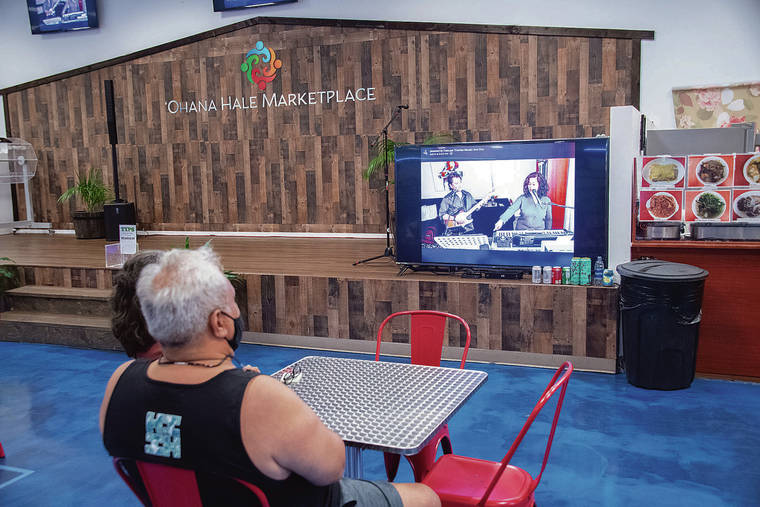Oahu coronavirus cases are fewest in 2 weeks

CRAIG T. KOJIMA / CKOJIMA@STARADVERTISER.COM
With live shows prohibited because of COVID-19, a video replay of entertainers Ben Vegas and Jeannette Trevias played for an appreciative luncheon crowd Monday at Ohana Hale Market Place on Ward Avenue.
A group of Hana residents and volunteers wearing bright yellow shirts began stopping vehicles along the road to Hana on Monday, urging occupants not to urinate and defecate along the side of the road or in sacred spots as state and Maui County bathrooms remain closed along the 30 miles into Hana because of COVID-19.
Volunteers wrote down license plates numbers and urged the occupants to lobby state and county officials to reopen seven bathrooms shuttered since the pandemic. While on the road to Hana, the occupants were encouraged to make purchases at fruit stands and businesses in Hana that have either portable toilets or bathrooms, said Napua Hu‘eu, a community organizer for the 4-year-old group, Hana Highway Regulation.
Out of dozens of vehicles driven by tourists, Hawaii residents and Hana drivers, the only problems were from Maui residents who questioned the authority of the volunteers who stopped them at Mile Marker 10 where the road to Hana narrows to one lane at a bridge, said Hu‘eu, 32, a lifelong resident whose family runs a fruit stand.
“The tourists were extremely understanding,” Hu‘eu said. “There were a few (Maui) kamaaina residents who expressed concern about the authority: ‘Where’s your authority to be doing this?’ In our community the community has home rule.”
The first checkpoint was set up Monday after Hawaii National Guard and Maui police officers last week stopped restricting traffic into Hana to just Hana residents, who were issued resident placards in April, Hu‘eu said.
On Sunday alone, members of Hana Highway Regulation counted 56 vehicles parked illegally, and many of the occupants were seen urinating or defecating along the side of the road and at beaches where bathrooms were closed.
Don't miss out on what's happening!
Stay in touch with breaking news, as it happens, conveniently in your email inbox. It's FREE!
“It’s not OK to use the restroom on the side of the road,” Hu‘eu said. “This is a fairly subsistence region. Everybody eats from the land and harvests from the land.”
Members of Hana Highway Regulation plan to stop vehicles again at its “Aloha Checkpoint” from about 7:30 a.m. to 2 p.m. today and again sometime later this week.
The checkpoint went up as 12 new confirmed cases of COVID-19 were announced Monday, representing the islands’ lowest number in two weeks, bringing the statewide total to 1,393 since the start of the pandemic.
On Oahu, 11 new cases were reported Monday, followed by one on Hawaii island.
Some 106,783 coronavirus tests have been administered as of Monday by state and clinical laboratories in Hawaii, and 1.3% have been positive. Health officials counted 827 new test results Monday.
The coronavirus-related death toll remained at 24 as of Monday, with 17 on Oahu and six on Maui. One was a Kauai resident who died in Arizona.
Monday’s statewide coronavirus case total included 1,079 on Oahu, 135 in Maui County, 114 on Hawaii island and 43 in Kauai County. The total also included 22 Hawaii residents diagnosed outside of the state.
At a Monday news conference at the state Capitol discussing the Aug. 4 resumption of school across the islands, Gov. David Ige urged people to maintain social distances, wear masks and practice good hygiene.
The state Judiciary announced Monday that beginning this week, uniformed, unarmed members of the Hawaii Air National Guard and Hawaii Army National Guard — just like at the state Capitol — will be making “contactless” temperature checks, asking health screening questions and enforcing mask rules for anyone trying to enter the state’s busiest courthouses.
Jury trials are scheduled to resume in September. In the meantime, anyone who has court business will not be allowed inside if they have a temperature of 100.4 degrees or higher, or cannot pass health screenings.
Judiciary officials urged people to arrive early to accommodate the new screening process.
The courthouses with Hawaii Air and Army National Guard presence are:
Kaahumanu Hale (Circuit Court), Kauikeaoluli Hale (Honolulu District Court), Kapolei Judiciary Complex and Aliiolani Hale (Hawaii Supreme Court) on Oahu; Hoapili Hale (Wailuku Courthouse) on Maui; Hale Kaulike (Hilo) and Keahuolu Courthouse (Kona) on Hawaii island; and Puuhonua Kaulike (Lihue) on Kauai.
“These courthouses serve significant numbers of people, and for many their presence is required by law,” Chief Justice Mark E. Recktenwald said in a statement. “Our commitment to access to justice includes helping people feel safe to walk through our doors, especially during this pandemic.”



